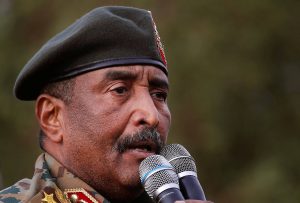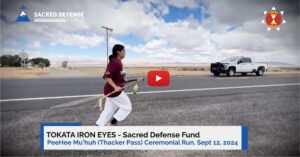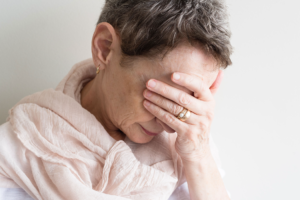Editor’s Note: David A. Andelman, a contributor to CNN, twice winner of the Deadline Club Award, is a chevalier of the French Legion of Honor, author of “A Red Line in the Sand: Diplomacy, Strategy, and the History of Wars That Might Still Happen” and blogs at Andelman Unleashed. He formerly was a foreign correspondent for The New York Times and CBS News. The views expressed in this commentary are his own. View more opinion at CNN.
Albina is 11, her little brother Danilo 9, and until recently they lived with their mother Ina and baby brother Kolya, aged 3, in a Ukrainian village barely five miles from the Russian border.
In May, the young family’s lives were ripped apart. Albina and Danilo were forcibly deported to Russia, leaving behind their mother and youngest brother.
In all, Ukrainian officials estimate roughly 20,000 children have been forcibly removed from their families in Ukraine and taken to Russia or Russian-occupied territories since the full-scale invasion began a little over a year ago.
Some have been subjected to horrific conditions in their captivity. All have been torn from mothers, fathers, families and homes — some for nearly a year, since the early days of the war.
In recent weeks, a handful — including Albina and Danilo — have been reunited with their families thanks to humanitarian organization Save Ukraine and its volunteers who ventured into Russian territory to free the children.
These deportations are utterly unconscionable, beyond humanity — as the International Criminal Court has now recognized by indicting Russian President Vladimir Putin and his top aide for childrens’ affairs.
In a lengthy phone conversation with Albina and Danilo’s aunt, Yana, this week, we discussed how the deportations unfolded — and the remarkable mission to bring these children home.

Yana, who also lived in the same Ukrainian village as the children, said that within hours of the full-scale invasion on February 24 last year, Russian troops had set up checkpoints throughout the town, carrying out door-to-door searches for anyone with ties to the Ukrainian government, police or military.
When the Russians found someone, the individuals simply disappeared, she said.
At 9.00 a.m. the invaders herded everyone into the local sports stadium and announced they had no intention of hurting any civilians, that their quarrel was with the Ukrainian government.
In the interim, life went on in the village, while Russian troops patrolled the streets and everyone lived in fear of sudden searches and seizures.
In April, there was a change. There arrived a new set of occupation forces — from the Russian Far East. A region from where troops were already accused of “committing war crimes in Bucha,” Yana explained.
Then on May 5, the evacuation began. Villagers were given 40 minutes to pack their belongings. A fleet of buses arrived. Albina and Danilo were given no option. But their grandmother, with roots on both sides of the border, and with whom the children were staying, was allowed to accompany them.
Mother Irina and youngest sibling Kolya were spared because of his age. The fleet headed for the Russian border. The kidnappings had begun.
Here, Yana picks up the story from the moment the children and their grandmother crossed the border into Russia.
Our conversation has been lightly edited for clarity.
Yana: They went immediately to a filtration camp, and they were told if you have somewhere to live in Russia you can go there. But if not, we will send you somewhere else in Russia.
The grandmother who was with the two children had a house in the Russian region of Belgorod because her parents had lived there, and this was only about 5 kilometers from the border.
So, this is where they went. The grandmother also had a sister and a brother in the area.
The children went to a Russian school. But the entire time the group of them were trying to plan how the children could come back to Ukraine and reunite with their mother.
They kept thinking that it would just be two to three weeks and it would end, and they could return to Ukraine.
At passport control when they crossed the border into Russia, they were told that they could stay in Russia for up to a year without any problem. They were also promised that they could go back to Ukraine regularly, but this promise was not upheld.
They were also told that after about a year staying on Russian territory, they would have to apply for Russian citizenship. So, with this in mind, they were looking for ways to get out of Russia as soon as possible.
It was just not possible to simply cross the border from Russia into Ukraine because of the heavy military presence. Furthermore, the entire territory, the border territory is completely mined.
Not just the checkpoints and the passport control points and the border crossings — but the houses, the roads. Everything is completely mined and under active shelling so it’s just completely unsafe to cross even if they wanted to.
After about six months, the Russian authorities told them that they needed to apply for Russian citizenship, or the social payments would stop.
They were heavily putting pressure on the grandmother to apply for Russian citizenship and get Russian documents. They were telling her that this was the only way for her to get medicine for herself and the children.
They were telling her that as a grandmother she was just too old to be without Russian citizenship and without the aid that it provided.
But they did not want Russian citizenship.
The children would constantly keep repeating and telling people that they were Ukrainian and that they were returning to Ukraine at some point.
David A. Andelman: Tell us about the school where the children went?
Yana: The adults in the school were very careful. There was no outright propaganda. They did not do anything to purposely hurt the Ukrainian children.
However, their classmates were bullying the children and poking fun at them for being Ukrainian and saying that it’s all Ukraine’s fault that this [war] is happening.
In the school that the children were in, they were the only two Ukrainians. They had to learn the Russian national anthem because every Monday they had a gathering of all the children in the school where they all sang it together.
And so the children had to learn it, and they did sing it, because otherwise that would cause some problems for the family.
The children were given special attention from the teachers. They were given individual courses three times a week, meeting individually with the teachers to catch them up on the material that they had missed because they had been going to a Ukrainian school.
It was all taught in the Russian language.
Andelman: How did they eat, what did they live on?
Yana: The social payments or benefits that were given by the Russian government was 10,000 rubles every month ($122), until November when they started pressuring them to get Russian citizenship. They went from 10,000 to 5,000 rubles after November.
They were also given humanitarian aid from the Russian government of some non-perishable food items. The grandmother also took some money with her when they were being evacuated.
So, she had that to rely on for the first few days and weeks until it ran out. The house they went to had a small garden and some chickens. The grandmother’s sister had a farm a bit further away and once about every two or three weeks, they would send some produce or some meat for the two children and the grandmother.
Andelman: What were they told about their future? Did the authorities threaten to send them deep into Russia away from the Ukraine border?
Yana: All the aunts and uncles and everyone in the family back in Ukraine for the entirety of the 11 months that the children were on Russian territory were trying to find a way to return the children as soon as possible. And this is what the children were being told.
Technically, the Russian authorities could not move the children anywhere further into Russia because the grandmother had a house in this town very close to the Ukrainian border. Still, their future really was so very uncertain.
There was no entertaining of the idea that the children would ever stay in Russia or go any further into Russia.
Andelman: While all this was going on, how were you coping back home in Ukraine?
Yana: It is very difficult for me to speak about this because I’ll start crying immediately. I took all of this upon myself to get the children back.
We were also in the process of moving from the small town that they had lived in near the border, to the city of Kharkiv. Our town had shrunk from a population of 1,500 before the war to 85 people. And there was shelling all around.
Andelman: So how did this finally come about? How did you finally arrive on the process of getting them back?
Yana: The most traditional way of returning the children is to have a parent go to Russia physically and get them. However, the children’s mother was not given permission by Russian authorities to cross into Russia.
She had a small child herself, and other family members who tried to get permission to cross into Russia to get the children, they were also not accepted.
We finally came to Save Ukraine. They filed documents to give a sort of power of attorney/guardianship arrangement to Katya, who is not related to the family in any way, but works as a lawyer for Save Ukraine. She was able to arrange for the trip of the children back into Ukraine.
But we were not able to know which path, how long it was going to be, when it was going to be, what was going to happen. It was in flux the entire time.
Until one day, the children got a phone call that tomorrow they would be put on an evacuation bus and taken back to Ukraine.
So that day happened, they were put on this bus and the journey was very long. It was five days in total.
Andelman: They were only 5 kilometers from the border, and it was a five-day journey?
Yana: It was not a straight shot because of all the fighting along the border. It was a five-day journey total (across Russia, Belarus, into Poland and finally across Ukraine). And the children were very tired, they had no idea where they were.
The children finally arrived back in Kyiv on April 8. The children were in very bad shape, they had been on this journey for five days. They were very young. And they were tired and dehydrated. In total there were 31 children on this evacuation bus. It was a very emotional and stressful affair.
In order to meet the children in Kyiv and return them to their mother, I had to leave my own child, which was the first time that I had ever been apart from my own child. And the whole thing is very difficult to describe in words.
The act of leaving your parents should only be an adult decision — something that’s done once you become an adult, deciding whether or not you would like to leave your parents’ home or the comfort and environment of your parents. It should not be done by force. This should never happen. What happened to this family should never happen to anyone anywhere.
Children, especially young children, should always be with their parents and not with anyone else.
Ukrainians in this family and so many other families don’t “need to be saved,” as the Russians repeatedly said to rationalize the invasion and the war and the kidnappings. The children did not need to be saved. Everything was fine. They did not need to be taken to Russian territory.
Andelman: Why do you think they were released now?
Yana: I did notice that around the time of this evacuation bus arriving in Ukraine that the children were on, the Russian children’s rights ombudsman, Maria Lvova-Belova, gave a press conference.
(On March 17, the International Criminal Court issued an arrest warrant for Lvova-Belova and Russian President Vladimir Putin for their removal of children from Ukraine since February 24, 2022.)
I think it’s also partly due to the phenomenon of Ukrainian unity that exists now, that this is able to happen — that children are able to be reunited with their families, despite the horrible circumstances and this terrible act.
Ukrainians are coming together to work towards righting the wrongs even during the full-scale Invasion.
Andelman: Did the grandmother come back with the children?
Yana: She is still there.
Andelman: What will happen to her?
Yana: She’s going to stay there in Russia and she’s going to continue living there. She’s not in a physical state to be traveling all around.
Andelman: And the rest of the family?
Yana: The village was liberated by the Ukrainian army in September, which also meant that they were able to freely move around.
As soon as it was possible, they moved to the city of Kharkiv, where it’s generally safer. And right now, everyone is there. All the children are at their maternal grandmother’s home also in Kharkiv.
They are making Easter bread and coloring Easter eggs — together.




